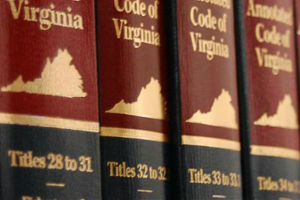 Navigating the Virginia Criminal Justice System, from Arrest to Sentencing
Navigating the Virginia Criminal Justice System, from Arrest to Sentencing
Have you, a friend or family member been charged with a crime in the City of Alexandria, Arlington, Fairfax, Prince William, Loudoun or elsewhere in Virginia? You probably realize by now that the process is arcane and confusing, and you probably have some questions about what to expect. Although procedures vary by jurisdiction, there is an overarching body of law that governs all of them, and this article is intended to answer some of the more basic questions regarding the criminal process in the Commonwealth of Virginia.
In Virginia, as with most other jurisdictions, crimes come in two varieties—misdemeanors and felonies—and the procedures applicable to each differ in many respects, including from the very moment the criminal process begins.
Generally speaking, felonies are crimes that may be punished with penitentiary time (as opposed to time in the local jail). Only persons sentenced to a year or more of incarceration may be sent to the penitentiary, so for all intents and purposes, a felony in Virginia is a crime that may be punished by a year or more of incarceration. Any offense for which the maximum penalty is 12 months or less is a misdemeanor.
Misdemeanors
Virginia divides misdemeanors into four classes according to the maximum punishment that may be imposed. The classes and potential punishments are as follows:
- Class 1: confinement in jail for not more than twelve months and a fine of not more than $2,500, either or both. Examples include Simple Assault, Petit Larceny and Disorderly Conduct.
- Class 2: confinement in jail for not more than six months and a fine of not more than $1,000, either or both.
- Class 3: a fine of not more than $500. Examples include Illegal Gambling and Possession of a Schedule V Drug
- Class 4: a fine of not more than $250. Examples include Possession of a Schedule IV drug, Public Intoxication, and Adultery (yes, adultery)
Arrest procedure for misdemeanors:
A misdemeanor prosecution begins with the issuance of a warrant or a summons. Virginia Code § 18.2-74. A warrant is issued by a judicial officer, typically a magistrate, upon a finding of probable cause to believe the subject of the warrant committed a crime, and it authorizes law enforcement to arrest that person and bring him to court. A summons, on the other hand, need not be issued by a judicial officer—rather, a law enforcement officer himself may issue the summons, which instructs the person being charged to appear in court at a particular time on a particular date.
If you were arrested on a warrant (or for any felony offense—see below), you may need to post a bail bond (or “bond”) in order to remain at liberty while your case is pending. A bond is a written promise signed by a defendant or a surety (one who promises to act in place of another) to pay an amount fixed by a court should the defendant named in the document fail to appear in court for the designated criminal proceeding at the date and time specified. If you were arrested on a summons, no bond will be required.
Misdemeanors—Advisement, Arraignment, Trial:
Following service of the warrant or summons, a misdemeanor case next proceeds to a district court (as opposed to a circuit court) to begin the adjudicatory process, and unless the offense involves juveniles or family or household members, it will be heard in the General District Court. Cases involving juveniles and parties that are family or household members are hearing in the Juvenile and Domestic Relations District Court.
Typically, the first hearing on either a warrant or summons is called an Advisement or Arraignment, however, in some instances the first hearing will in fact be the Trial (the nature of the hearing should be evident from the charging document, supporting documentation or as a last resort from the clerk of court). If the first hearing is an Advisement or Arraignment, you need not worry about pleading guilty or not guilty, calling witnesses, or arguing your case; the purpose of the hearing is merely to formally advise you of the allegation, select a court date for trial, and determine whether or not you qualify for court-appointed counsel.
All misdemeanor trials held in Virginia district courts are “bench trials”. This means that they take place before a judge sitting without a jury, and the judge alone decides whether you’re guilty or not. If you are beginning to wonder about your constitutional right to a jury trial, don’t worry: Virginia preserves that right in misdemeanor cases in an interesting way, one that creates an undeniable advantage for defendants. If you are convicted in a district court of a misdemeanor, you have a right to appeal your case to the circuit court. In addition, there are no strings attached to your appeal: it is a “de novo” appeal, meaning that once you note your appeal, the circuit court wipes the slate clean, and treats the district court proceedings as if they never happened. In essence, by virtue of the right to a de novo appeal, every defendant is allowed two bites at the apple.
It should be noted that, unlike district courts, Circuit Courts in Virginia are courts of record. A court of record is one whose judgments and proceedings are kept on permanent record, including by employing court reporters to record and transcribe proceedings. Not only do you have a right to a jury trial in the Circuit Court (Virginia uses 7-person juries in misdemeanor cases), but because the Circuit Court maintains a record of the proceedings, you have a right to appeal a conviction to the Virginia Court of Appeals (that appeal, however, is much more limited than the “de novo” appeal from District Court to Circuit Court).
Felonies:
There are six classes of felonies in Virginia. In addition, there are a number of “unclassified” felonies (e.g. grand larceny) that do not fit within any of the following statutory guidelines for punishment:
- Class 1: capital felonies, the punishment for which is death or life in prison without parole and a fine of not more than $100,000.
- Class 2: imprisonment for life or for any term not less than 20 years and a fine of not more than $100,000.
- Class 3, a term of imprisonment of not less than five years nor more than 20 years and a fine of not more than $100,000.
- Class 4: a term of imprisonment of not less than two years nor more than 10 years and a fine of not more than $100,000.
- Class 5: a term of imprisonment of not less than one year nor more than 10 years, or confinement in jail for not more than 12 months and a fine of not more than $2,500, either or both.
- Class 6: a term of imprisonment of not less than one year nor more than five years, or confinement in jail for not more than 12 months and a fine of not more than $2,500, either or both.
 Arrest and Adjudication Procedure for Felonies in Virginia:
Arrest and Adjudication Procedure for Felonies in Virginia:
Felonies commence via warrant or indictment—there is no such thing as a summons in a felony case in Virginia. Felony warrants are the same as in misdemeanor cases, in that they are issued by a judicial officer and must be supported by probable cause. And just like in misdemeanor cases, if a felony begins with the issuance of a warrant, the adjudication of that case begins in a district court.
District courts may not conduct felony trials, however. Rather, they only have jurisdiction to determine probable cause in felony cases. For that reason the life span of a felony that commences with a warrant looks something like this: the person accused usually is arrested on a warrant and brought before a magistrate. The magistrate may either commit the accused to jail pending a hearing or release the accused on bail. A preliminary hearing is then held in district court to determine if there is probable cause to believe the accused has committed the crime charged. If probable cause is found, the case is certified (sent) to the grand jury. If the grand jury also finds probable cause, an indictment is returned.
An indictment is a formal written accusation, drafted by a prosecutor but found and presented by a Grand Jury, which charges that the subject committed a crime. Indictments are only produced in Circuit Courts. However, they need not arise out of the arrest warrant/preliminary hearing process described above. Virginia also authorizes what is known as a “direct indictment”, which is an indictment that either was not preceded by any warrant or preliminary hearing, or was preceded by a warrant and a preliminary hearing in which a district court declined to find probable cause. Direct indictments are relatively uncommon, and most often occur in serious felony cases, frequently with strategic considerations in mind, such as depriving the defendant of a preliminary hearing, which is only available in a district court following arrest on a felony warrant.
Following indictment, the accused is arraigned; that is, the charges are read and the accused enters a plea of guilty, not guilty, or nolo contendere (no contest). In Virginia this usually occurs on the same day as a trial, unlike Federal courts, which arraign defendants well in advance of trial. From there, a defendant may have a bench trial or a jury trial. Felony juries in Virginia consist of 12 members of the community, all of whom must agree unanimously that the defendant is guilty beyond a reasonable doubt in order to convict him.
Felony Sentencing:
One of the foremost procedural oddities in Virginia felony cases is jury sentencing. If a defendant pleads not guilty and elects a bench trial, or if he pleads guilty or no contest, he will be sentenced by a judge. Judge sentencing includes many procedures intended to ensure fairness and uniformity between similar defendants, such as sentencing guidelines (a recommendation for punishment according to what like defendants usually receive), the ability to suspend prison sentences, and the ability to order probation or other alternatives to incarceration.
By contrast, if a defendant elects to be tried by a jury in Virginia, he will be sentenced by a jury. Not only that, but the jury that sentences him will not have any of the tools a judge has at his disposal to ensure fairness and uniformity. The only information the jury receives is the statutory punishment range for each felony offense, which can suggest to the jury that sentences far longer than those recommended by sentencing guidelines are appropriate. Although juries often return very lenient sentences, they are also much more likely than judges to impose sentences far in excess of the sentencing guidelines, and for that reason jury trials entail risks at sentencing that are not present in bench trials.

